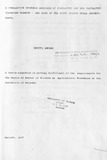| dc.contributor.author | Andama, M | |
| dc.date.accessioned | 2013-05-11T09:41:41Z | |
| dc.date.available | 2013-05-11T09:41:41Z | |
| dc.date.issued | 1997 | |
| dc.identifier.citation | Andama, M(1997). A comparative economic analysis of contracted and non-contracted sugarcane farming - the case of the South Nyanza sugar project , Kenya | en |
| dc.identifier.uri | http://erepository.uonbi.ac.ke:8080/xmlui/handle/123456789/21883 | |
| dc.description | msc-Thesis | en |
| dc.description.abstract | This study is an economic analysis of the contracted and non -
contracted systems of sugarcane farming. In the analysisl the South
Nyanza Sugar Company (SONY SUGAR) in South Nyanza District was used
as a case study. The broad obj ecti ve of this study was to
undertake a critical review and assessment of the Kenyan sugar
industry in general 1 and in particular analyze the contracted and
non contracted organizational structure of the sugarcane enterprise
at SONY SUGAR. This would assist to identify and examine the
bottlenecks inherent ln the two systems of sugarcane farming.
The sources of lnformation used were primary and secondary data.
The former were generated via a questionnaire administered to a
sample of 50 farmers from each of the two systems of cane
production. The. secondary data werel however 1 obtained from
relevant published documents. The analytical
included descriptive statistics and gross margin
The results reveal that it costs twice as much
tools applied
analyses.
to establish and
market one hectare of qontracted sugarcane (Kshs 22/890) compared
to that in non - contract sugarcane (Kshs 11/222) The study also
reveals that sugarcane farming is relatively more remunerative to
the non - contracted farmers than the contracted ones. Furtherl the
Contract Agreement impacts negatively on sugarcane product ion "-
giving rise to numerous cases of independent non - contract cane
farming in the project area.
The study recommends that the Contract Agreement should be revised
and re-written with incentives to attract farmers to the
outgrowe~s'scheme. The study recommends that the Contract
Agreement should be revised and re-written with incentives to
attract farmers to the outgrowers'scheme. The revised scheme
should encourage farmers to perform as many operations of
production as possible on their own to reduce the costs of cane
farming and thus raise their net cash incomes. The large number of
transac~ions that take place between the sugar company and the
individual farmers together with the subjective nature of
judgements about produce quality by the former has often lead to
conflicts. As a result, accusations between the two parties over
the performance~and execution of the contract arise frequently. A
third party most probably the Government should therefore provide
a mechanism to solve such conflicts by requiring or providing a
neutral arbitrator to whom the cane farmers or the sugar company
can refer to in cases of disputes. The study also recommends that
al~ the lines of non contracted
structure be encouraged as it is a more viable form of rewarding
the producer? for their investment in the industry. Finally, the
study rec~encl$_that a farmers' produc.eL-Organization suc}~._asthe
existing South Nyanza Sugarcane Outgrowers' Company (SaC) should
be strengthened to increase the farmers' bargaining power and
coordination between them and the Sugar company. In the long run,
the organization should be encouraged to take over the services now
rendered by the sugar company including the ownership of the
sugar company by floating shares. sac should be set up as a
limited liability company by Government guarantee.
This guarantee is deemed useful ln attracting ccrnme~Cla~ banks'
financing instead of depending on the sugar company as a financier.
sac should also be involved in the establishment, maintenance' and
transport aspects of cane and also provide machinery for farm level
operations including harvested cane transportation. It should also
provide advisory cane extension services to the cane farmers. It
has already established a savings and credit unit to enable farmers
to finance their agricultural practices as well as spread their
earnings from cane to cover their consumption requirements in the
long spells of two years between two cane harvests. | en |
| dc.description.sponsorship | University of Nairobi | en |
| dc.language.iso | en | en |
| dc.subject | Economic analysis | en |
| dc.subject | Contracted farming | en |
| dc.subject | Non-contracted farming | en |
| dc.subject | South Nyanza | en |
| dc.subject | Sugar project | en |
| dc.subject | Kenya | en |
| dc.title | A comparative economic analysis of contracted and non-contracted sugarcane farming - the case of the South Nyanza sugar project , Kenya | en |
| dc.type | Thesis | en |
| local.publisher | Department of Agricultural Economics, University of Nairobi, Kenya | en |

